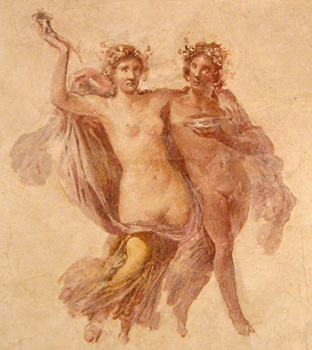
1 century CE |
It is startling to encounter the name Postumia in this drinking song, for this matrona was a member of the noble gens Postumia (see women's names), famous for its statesmen (notably the stern Aulus Postumius Tubertus Maior, dictator and victor over the Aequians and Volscians in 431 BCE). Livy records a Vestal of that name who narrowly escaped the public charge of immodesty in 420 BCE (see WRW, pp. 102-3). Wife of the famous lawyer Servius Sulpicius Rufus, a consul (51 BCE) and friend of Cicero, Postumia was the mother of Servius minor, whom Horace mentions for his literary cultivation (Sermones 1.10.86). In 49 BCE, Postumia accompanied her son to a conference with Cicero about her husband's political future (Epistulae ad Familiares 4.2). In this poem, however, Catullus was not tarnishing an unblemished reputation, for Suetonius lists Servius' wife among the mistresses of Julius Caesar (Vita Divi Iuli 50.1). Catullus may have lampooned Postumia as a prologue to satirizing her powerful male ally; it is important not to read the poem literally. Postumia is presented as a tipsy female Master of the Feast (magister bibendi; arbiter bibendi: Horace, Carmina 2.7.25-6), forcing drinkers into drunkenness by banishing water from their cups. The poem is patterned on the Greek skolia, agonistic drinking songs featured at symposia from the 7th century BCE onward (see G. Nagy's article on their transmission). The meter, hendecasyllabic (Phalaecean), is cleverly employed. |
| 1 | Minister vetuli puer Falerni |
| inger mi calices amariores, | |
| ut lex Postumiae iubet magistrae | |
| ebrioso acino ebriosioris. | |
| 5 | at vos quo lubet hinc abite lymphae, |
| vini pernicies, et ad severos | |
| migrate. hic merus est Thyonianus. |
Click on the underlined words for translation aids and commentary, which will appear in a small window. Close the small window after final use.